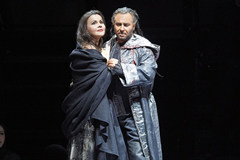| Opera Reviews | 23 April 2024 |
Alagna and Kurzak team up in a credible Otelloby Moore Parker |
|
| Verdi: Otello Vienna State Opera 12 March 2018 |
|
|
With neither tenor nor soprano naturally destined for their roles, the prospect of husband-and-wife team Roberto Alagna and Aleksandra Kurzak’s first Vienna Otello was tantalising - and, indeed, in many respects rewarding. In the title role, the French-Italian tenor proved the surprise of the evening - staying the testing course and never appearing to economize. On the contrary, he slightly over-sustained the occasional high note in full forte - as if to prove his mettle to all. If remaining essentially lyrical, Alagna’s clever technique, and ideal amalgam of grain and ring to his well-projected tone - combined with a natural stage instinct - absolutely won the day. In essence, he created a credible Otello with no more than a couple of moments throughout the arduous evening which longed for greater vocal thrust or stamina. Miss Kurzak is a ravishing performer, looking but 25 on this occasion, and wearing her costumes with elegant, yet sensual, grace. Like her spouse, her ability to transport a message, combined with a sympathetic stage presence and an appealing lyrical tone brought her success - and indeed, the most vociferous accolades at the curtain. Only in her dramatic Act 3 exchange, "Dio ti giocondi …" and in the same act’s finale, did her instrument capitulate (compensated, however, rather astutely through dramatic posture). Unfortunately she missed an entry in this scene, and again in her Willow Song, which was otherwise performed with fine poise, and sealed with a perfectly floated A-flat to close the Prayer. Also performing his part in Vienna for the first time, Dalibor Jenis reminded that this is not just one of today’s leading Iagos , but a singing-actor of top rank, drawing upon rich vocal resources which appear to blossom as he ascends the scale - while nonchalantly negotiating any staging demands with aplomb. Here was a rarely meticulous execution of the score - a feature which naturally further enhanced the interpretation and character’s credibility. Jenis’ physical dominance over Alagna slightly weakened certain moments dramatically, but both artists cannily compensated as best possible in the given situation. Giving an auspicious debut, Antonio Poli’s Cassio was an excellent mix of youthful swagger and bumbling naivety, vocally imposing, and showing undoubted potential for an interesting future. As Rodrigo and Emilia, both Leonardo Navarro and Ilseyar Khayrullova gave solid first-time performances in their respective parts, while the remaining soloists, Alexandru Moisiuc (Lodovico), Orhan Yildiz (Montano), and Hacik Bayvertian (The Herold) rounded-off the cast. While not one of Graeme Jenkins' more consummate evenings in the house (with co-ordination issues perchance due to the thoroughly awkward staging and possible lack of rehearsal), this 40th performance in the production saw many fine moments, which despite its shortcomings scored through credibility and impact.
|
|
| Text ©
Moore Parker Photo © Wiener Staatsoper / Michael Pöhn |

 With the majority of the soloists giving role debuts in the house, this was a challenging - but interesting - revival, albeit one marred somewhat by variances between pit and stage to underscore this obtuse production based on a concept by Christine Mielitz. The disco-like gyrations involving ensemble and (on occasions) the leads, the illogical choreography and direction, and spotlights which defiantly ignore protagonists in their big moments in lieu of blending guests in the stalls, seemed even more offensive in this revival - with at least one observer wishing for a new equitable setting for one of opera’s greatest treasures.
With the majority of the soloists giving role debuts in the house, this was a challenging - but interesting - revival, albeit one marred somewhat by variances between pit and stage to underscore this obtuse production based on a concept by Christine Mielitz. The disco-like gyrations involving ensemble and (on occasions) the leads, the illogical choreography and direction, and spotlights which defiantly ignore protagonists in their big moments in lieu of blending guests in the stalls, seemed even more offensive in this revival - with at least one observer wishing for a new equitable setting for one of opera’s greatest treasures.





